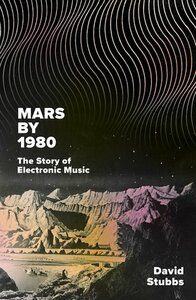Take a photo of a barcode or cover
I loved the breadth of artists covered, and the introduction to so many that are new to me. Unfortunately, the writing was, too often, sloppy. I get the distinct feeling this book was hastily put together, with not enough time to give it a proper edit. Or maybe I’m just not a fan of this kind of describe-it-in-every-kind-of-metaphor-possible style of music writing. And my head hurts from being bashed with the hammer that is Stubbs’ disdain for Margaret Thatcher’s politics (which is fair enough but I think she gets name-dropped more than half the artists profiled). Still, it’s a treasure trove of sonic delights to be explored, and maybe that’s the better way to take in this book: Read a little bit, stop, and listen.
informative
medium-paced
Twisting and turning walk through of musical/social history. Great details and makes some surprising connections.
A fairly sweeping look at electronic music from it's naissance in 20th century experiments right up to modern-day sound technology.
Stubbs is comprehensive but not exhaustive, and says as much in the introduction. What is covered however is more or less the length and breadth of major names and developments, all relayed varyingly in anecdotes, interview quotes, and general cultural history and theory.
Stubbs is comprehensive but not exhaustive, and says as much in the introduction. What is covered however is more or less the length and breadth of major names and developments, all relayed varyingly in anecdotes, interview quotes, and general cultural history and theory.
Mars by 1980: The Story of Electronic Music is a strange, duck-billed platypus of a book. It’s clearly trying to be something of an comprehensive narrative history of electronic music, but Stubbs doesn’t always follow through on this. In some places it’s a personal reminiscence of the author’s discovery of different music, in others a socio-political tract analysing the background and context to different musical movements.
In the areas he covers well, Stubbs is excellent - his analysis of the early roots of electronic music from Varese and Xenakis to the concrete and radiophonic are strong and he’s clearly knowledgeable and passionate about the wider subject. There are however glaring omissions (Tangerine Dream, OMD and Yellow Magic Orchestra are only mentioned en passant, Boards of Canada do not appear at all) which mean this is far from authoritative.
That said, Stubbs is an engaging and amusing guide through the process (he’s never backwards in coming forward with an opinion), and some sections (particularly his appraisal of Stevie Wonder in the context of his work with electronic music) are worth the price of admission alone.
In the areas he covers well, Stubbs is excellent - his analysis of the early roots of electronic music from Varese and Xenakis to the concrete and radiophonic are strong and he’s clearly knowledgeable and passionate about the wider subject. There are however glaring omissions (Tangerine Dream, OMD and Yellow Magic Orchestra are only mentioned en passant, Boards of Canada do not appear at all) which mean this is far from authoritative.
That said, Stubbs is an engaging and amusing guide through the process (he’s never backwards in coming forward with an opinion), and some sections (particularly his appraisal of Stevie Wonder in the context of his work with electronic music) are worth the price of admission alone.
A fairly sweeping look at electronic music from it's naissance in 20th century experiments right up to modern-day sound technology.
Stubbs is comprehensive but not exhaustive, and says as much in the introduction. What is covered however is more or less the length and breadth of major names and developments, all relayed varyingly in anecdotes, interview quotes, and general cultural history and theory.
Stubbs is comprehensive but not exhaustive, and says as much in the introduction. What is covered however is more or less the length and breadth of major names and developments, all relayed varyingly in anecdotes, interview quotes, and general cultural history and theory.
David Stubbs—the author of this book—wrote "Future Days: Krautrock and the Building of Modern Germany", an excellent recant of how "kosmische" music came about. In that book, he kept a narrow view of how things came to be, and founded much of his analysis on interviews with musicians.
This time, he has written a book that is both sprawling and, at times, probably verges into the fictional, at least where he digresses on actual words from musicians and theories on why they did things.
Having said that, this book does contain much information that is probably of importance both to persons like the perennially name-dropping Moby, and to persons who want to receive a skimpy version of electronic music history. The forté and pain of this book both lie in the fact that it skips over a lot of theory quickly. It's also sensationalistic, which is almost always a bad thing to myself, and to the facts.
The best about Stubbs's writing is undoubtedly his style:
The book goes from Schaeffer, Rossolo, Stockhausen, and Ligeti, all to Aphex Twin, Actress, and...it's a hyperkinetic mash-up; at times, it felt stressed and forced, other times it felt as though Stubbs's language and style really did the music and the artists a huge service. However, if you want a pop-ish view of the history of electronic music, I can't think of a better place to start than this book.
This time, he has written a book that is both sprawling and, at times, probably verges into the fictional, at least where he digresses on actual words from musicians and theories on why they did things.
Having said that, this book does contain much information that is probably of importance both to persons like the perennially name-dropping Moby, and to persons who want to receive a skimpy version of electronic music history. The forté and pain of this book both lie in the fact that it skips over a lot of theory quickly. It's also sensationalistic, which is almost always a bad thing to myself, and to the facts.
The best about Stubbs's writing is undoubtedly his style:
Practically the moment it beams down, ‘I Feel Love’ feels like first contact: the slow opening of the spacecraft door, the blinding shaft of green light. This is … what is this? Brian Eno hears it and rushes straight into David Bowie’s studio, claiming to be holding the future in his hands. Sparks hear it and promptly decide to ditch their band, hit up Moroder and function as an electronic duo. And that’s just the start.
What’s also striking, and similarly depressing, is that pop hasn’t been this non-queer since the days of Rosemary Clooney, the early 1950s. Gay culture had always been one of the great underground drivers of rock and pop, from Little Richard right through to Hi-NRG, often necessarily coded in a world that was institutionally homophobic. And yet today, when gay rights, while by no means universally accepted, are more established in the Western world than ever before, queer pop has disappeared. The charts in 2017 are primarily an idyll of young, photogenic, heterosexual love, preferably experienced in a seaside environment.
A few weeks after I interviewed them, I was at a record-company bash. Though I had spent an hour in their company, when Bangalter flagged me down to say ‘Hi’ there was a mortifying second or so before I remembered who he and his partner, Guy-Manuel de Homem-Christo, were. Daft Punk, however, had a grasp on the immediate future. ‘Today, it’s possible to make a record in your bedroom at a cheap price,’ said Bangalter. ‘Our album, Homework, is cheaper than nearly any rock album. No studio expenses, producers, engineers. We’re not saying there is a right way or wrong way to go about things, but this is certainly a way. When we started to make music, we were just trying to form the teenage band everyone wants to be in.’
For Futurists like Luigi Russolo, as well as visionary composers such as Busoni, Varèse and, later, Stockhausen, new electronic modes of music-making weren’t novelties, conveniences, cost-cutting devices or objects of tinkering fascination for gadget nerds who were less than human in their make-up. They were the means whereby music would exceed the bounds of mere scripted notation, explore infinite possibilities in tandem with a world whose technological leaps and bounds seemed limitless. In their wildest dreams, they truly believed that electronic music could soundtrack, or even by some occult means be the source of, an expansion of mankind’s capabilities.
Stockhausen’s mind was a brilliant one, operating with the strength of multiple lasers. He could speak – in detail and with a conviction lesser brains found hard to counter – of ancient Japanese ritual and musical custom, of horticulture, of Eastern mystical thought, of the all-embracing importance of spirals (an idea introduced to him by the English writer Jill Purce, with whom he liaised in the early 1970s), allude easily to philosophers like Pierre Teilhard de Chardin, as well as explain, to those with the ability to take it in, the workings of serial music, notions such as periodicity and harmonic perspective. He could out-converse most people across a range of topics, without even resorting to his first language.
‘You know people are going to laugh?’ the host warned Cage gravely – though that, of course, was the entire purpose of this TV exercise. Cage refused to play the stuffed avant-garde shirt. ‘I consider laughter preferable to tears,’ he said, to more laughter. The host referred to Cage as someone who dealt in ‘experimental sound’, only to be firmly corrected by Cage. ‘Experimental music,’ he said. He explained simply that since music was the production of sounds, and sounds were what he produced, then the result was music. It was that simple. He would demonstrate this to the audience with his presentation of ‘Water Walk’, so called because it featured the running of water and himself walking through the piece, event by event.
Even seventeen years later, Alan Vega couldn’t hide his bitterness at the success Soft Cell enjoyed. ‘Suicide finally get to go to Britain, in 1978. And sure enough, a year or so later, you’ve got this big techno-pop explosion. Soft Cell, who admit to being influenced by Suicide – one guy on vocals, one guy on keyboards. And what happens? Soft Cell go on to sell millions of records, Suicide sell squat. Soft Cell come to America, they’re huge, we come back, nada. To this day.’
The book goes from Schaeffer, Rossolo, Stockhausen, and Ligeti, all to Aphex Twin, Actress, and...it's a hyperkinetic mash-up; at times, it felt stressed and forced, other times it felt as though Stubbs's language and style really did the music and the artists a huge service. However, if you want a pop-ish view of the history of electronic music, I can't think of a better place to start than this book.
Great subject but dull execution although enjoyed reading about the women of the BBC Radiophonic Workshop.




